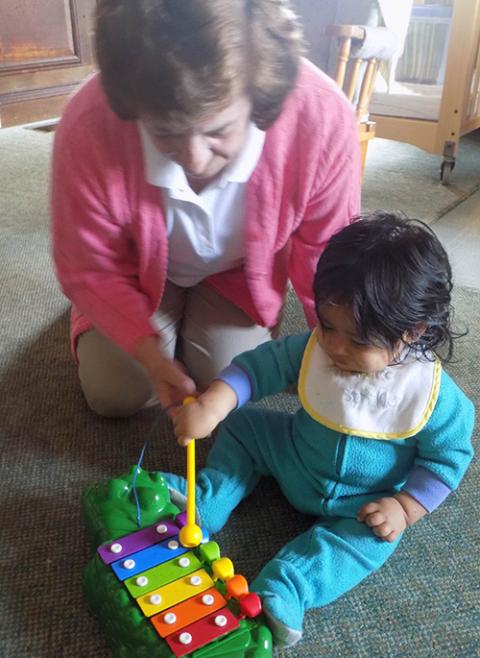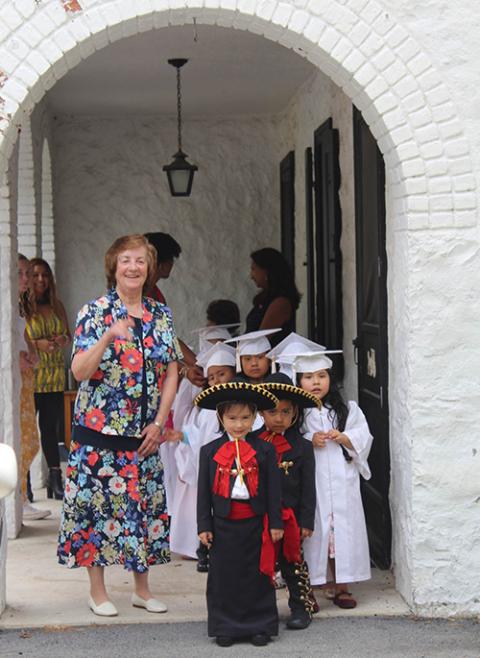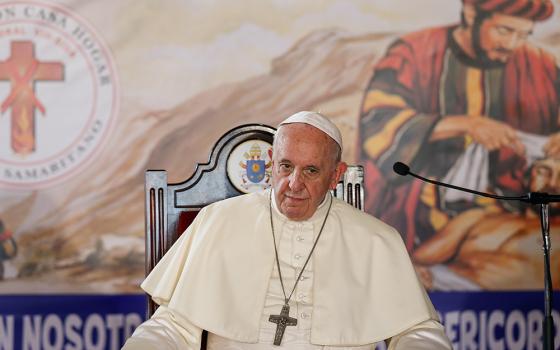
Dominican Sr. Jean Graffweg gives flowers to a House on the Hill student at their 2019 graduation ceremony. The facility in Goshen, New York, hosts a Head Start program that serves about 45 children ages 2 months to 5 years old. (Courtesy of Sisters of St. Dominic of Blauvelt, New York)
Sr. Jean Graffweg has a confession: After 42 years of ministry to the children of migrant farmworkers picking lettuce, radishes and onions in New York's Orange County, she loves her job but hates onions.
"When you go out in the fields early in the morning, that's all you can smell," she said.
Smelly onions aside, Graffweg of the Sisters of St. Dominic of Blauvelt, New York, loves the landscape, the people and the work of House on the Hill, which she first visited as a summer volunteer while teaching in Rhode Island in the 1970s. She was hired to teach kindergarten at the Blauvelt Dominican ministry site in 1981 and now serves as its director of migrant Head Start, a federal early-childhood education program for vulnerable children and families.

Dominican Sr. Jean Graffweg is pictured in front of the fields at House on the Hill in Goshen, New York, where she directs the Head Start program serving children of migrant farmworkers. Her community started House on the Hill after observing young children playing in the fields while their parents worked. (Courtesy of Sisters of St. Dominic of Blauvelt, New York)
The Blauvelt Dominicans helped open House on the Hill in 1972 after observing children playing in the fields and babies resting in boxes as their parents picked vegetables nearby. Their goal was to care for and educate the children of migrant farmworkers in Goshen, New York.
When Graffweg arrived, five sisters worked at House on the Hill. Seven Dominican sisters have ministered there over the years. Graffweg, now the only sister on staff, oversees a Head Start staff of 19 who work with about 45 children, ages 2 months to 5 years old.
Her tasks over the years have included teaching, driving the bus to pick up children, and making breakfast when they're short-staffed. House on the Hill recently celebrated its 50th anniversary.

Dominican Sr. Jean Graffweg stands in front of House on the Hill in Goshen, New York. The facility, which now hosts a Head Start program serving the children of migrant farmworkers, recently celebrated its 50th anniversary. Graffweg has worked there 42 years. (Courtesy of Sisters of St. Dominic of Blauvelt, New York)
GSR: How did you end up at House on the Hill?
Graffweg: I knew I wanted to do humanitarian work, so that led me to the Sisters of St. Dominic. I entered the convent in 1965. My first mission was in Daytona Beach, Florida. I was teaching in a Catholic school, and we were in a house that was almost condemned. I did not care for it at all.
I was in Daytona for five years. Then I wanted to continue my education, so they sent me to Rhode Island, which I loved. I earned a master's and taught eighth and ninth grade. I was in Rhode Island for seven years. In the summers, we had to volunteer. In 1981, I came here. It's 300 acres and beautiful. I thought it was wonderful.

Dominican Sr. Jean Graffweg plays with a child at House on the Hill in Goshen, New York. She started out working at the facility's toddler room and now directs its migrant Head Start program. (Courtesy of Sisters of St. Dominic of Blauvelt, New York)
What was your early work like?
I taught in the toddler room, which was very different from teaching eighth grade. I would take my kindergarten group through the fields. It was a free, wonderful place.
If they're new here, they come speaking Spanish. Within two months, they are bilingual.
What were your first impressions of the migrant families you met?
What really struck me was how close the families were. It was grandmothers, it was aunties and uncles. They lived together in a very close-knit family structure. They have a support system within the family. They love their children immensely. I don't go around telling people how wonderful the families are. They see. None of our families want government handouts. They are not on food stamps.
Most of the time, everybody in the family worked, and the hours were long. They were in the fields at 6 in the morning, and they did not get out until it was dark. The moms were able to get out early so they could care for the children when we bused them home. Transportation was door to door. We would go to at least seven farms to pick up children. Their housing was a long cement block structure. Each family had two rooms and a bathroom shared in the middle.
How's your Spanish?
Terrible. I know. It's been 42 years! I first was hired to work with migrant mothers, and we would teach them English, but I never learned Spanish.
Advertisement
How has House on the Hill's ministry changed over the years?
The original goal was to educate children of migrant workers. Now, we have many services: family engagement, health services, disability services, nutrition programs and community partnerships. It evolved as the years progressed. Whatever the needs were, my community responded to them.

Dominican Srs. Jean Graffweg, right, and Caritas Wong are pictured with a baby in this undated photo taken at House on the Hill. When Graffweg started working there, she was one of five Dominican sisters there. She is now the only sister on staff. (Courtesy of Sisters of St. Dominic of Blauvelt, New York)
How has the partisan immigration debate affected the families?
In 1986, President [Ronald] Reagan offered any migrant farmworker a path to citizenship. But our people were afraid of it. They were afraid of being deported, I think. Now, they are like pawns [in the immigration debate].
Tell me about the farmworkers there now.
Most families are here year-round, and some travel in the migrant stream to Florida and Texas. Most are Mexican. It's mostly the same families every year. It's like [a reunion] when they arrive. If they're good [workers], the farmers will keep them on til January or February.

Dominican Sr. Jean Graffweg stands with House on the Hill students at their 2019 graduation ceremony. House on the Hill was founded in 1972 to educate children of migrant workers. It has since added many services, including health, disability and nutrition programs. (Courtesy of Sisters of St. Dominic of Blauvelt, New York)
Right now, we're serving 38 families. It's not as many as it used to be, but a lot of the farms have disappeared. The children of the farmers do not want to be in the work.
How has the pandemic affected your work?
COVID has been very difficult. We all wear KN95 masks, including 2-year-olds. We have an open-door policy, but we've had to do some restrictions. We've had children with COVID, right down to infants, but everyone survived. We have about 45 students right now. It used to be 75 before COVID.
What's the most frustrating thing about your work?
Paperwork. I hate it.
What's the most rewarding thing?
Greeting the children when they come in in the morning. They want their morning hug. We used to have transportation, but now, parents bring them. I greet them at the door.
Forty-two years is a long time for one ministry. How long do you expect to stay?
I'll stay here with my boots on. It's something that has become so much a part of my life that I don't see myself doing anything else. The families are wonderful and grateful.
How does your work connect to St. Dominic's values and to your community's charism?
There's a connection with the mission of the congregation of working with the poor. I see God in these people. The families trust us with their children eight hours a day. That in itself is so beautiful.








